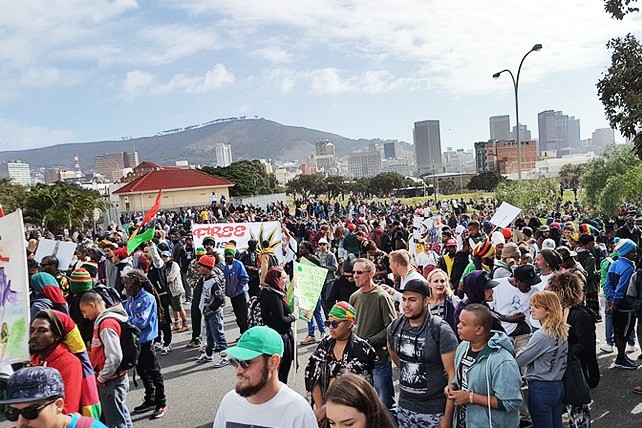The Government’s recent deportations of “serious foreign national offenders” are the most recent and poignant example of the so-called ‘colour line’, argues Lola Brittain for Byline Times.
Rhetorically, drug policy is objective and indiscriminate. Practically, it is quite the opposite. As the recent deportations over minor drug offences make clear, the drug war produces profoundly different outcomes depending on race.
Last week, 17 people were deported to Jamaica by the Government for being “serious foreign national offenders”. The Home Office has refused to release a breakdown of the crimes they committed, but at least four of those on board were condemned to a life away from their family and friends for minor drug convictions.
Throwing together non-violent drug offences with crimes of the highest order – such as rape, murder and manslaughter – Cabinet members have repeatedly insisted that those deported were “serious, violent and persistent foreign national offenders”.
But, as the case of Tajay Thompson demonstrates, this is false. Spared at the eleventh hour by a successful legal case, Thompson was convicted of possession with intent to supply, serving half of a 15-month sentence in 2015. Groomed into a ‘county lines’ operation when he was just 17 – in which vulnerable youngsters are recruited by adult drug dealers to travel to rural parts of the country to sell drugs on their behalf – it is difficult to see how he fits the definition of a “serious, violent or persistent criminal”.
This poses two questions. Firstly, can the Government really continue to condemn ‘county lines’ while deporting its victims? Secondly, why, as Jeremy Corbyn put it, is it “one rule for young black boys from the Caribbean and another for white boys from the United states?”
Boris Johnson admitted to taking cocaine as a teenager, as did Michael Gove as a young journalist. However, the trajectory of their lives have been nothing but positive and they have faced no consequences of their admissions. Granted they have admitted to taking drugs, not selling them, but how do they think cocaine is acquired? As free marketers, they must know that supply is created by demand.
Both claim that it was a mistake, but that their “foolish” choices should be overlooked. To quote Gove: “I don’t believe that past mistakes disqualify you”. Essentially, a mistake is a mistake and it shouldn’t tarnish your life years down the road.
Taking a stance that exudes hypocrisy, Junior Minister Kevin Forester insisted, on behalf of the Government, that what matters is “criminality, not nationality”, but what the Jamaica deportations demonstrate is that involvement with drugs is fine if you are white and middle-class – even better if you were educated at Eton College. It is a way to appear ‘down with the kids’ and in touch with reality; a talking point to make a political campaign more interesting or an indulgent memoir less drab. But, for people of colour – particularly young black men – drugs have severe consequences.
The racial dynamics of the illegality of drugs are often discussed in an American context, where the drug war has been referred to as ‘the new Jim Crow’ and it is all but agreed that anti-drug laws were created in response to fear and hatred of ethnic minority groups. But the significance of race isn’t exclusive to the US’ Drug Enforcement Administration. We may talk of tolerance and multiculturalism, and pretend to be mostly rid of racism, but in the UK, as in the US, the affect and application of drug laws shift according to race.
The Jamaica deportations are the most recent, and perhaps most poignant, example of the so-called ‘colour line’, but racial bias manifests through each and every layer of the law. There are wide disparities in arrests, sentencing and prosecutions. Despite a lower ‘find’ rate, black people are more likely to be stopped and searched by police and more likely to face a rigorous examination.
Over the past two decades, racial imbalance has skyrocketed. In 2004, black people were four times more likely to be stopped and searched than white people. In 2019, the ratio was 10:1. In light of growing criticism, knife crime has been used to defend the power – which has long been declared racist – but the narrative doesn’t match the statistics. Last year, suspicions of drug possession accounted for 61% of all counts of the controversial practice.
And the discrepancies don’t stop there. According to a report published by StopWatch, Release and LSE’s International Drug Policy Unit in 2018, black people were convicted of cannabis possession at 11.8 times the rate of white people. Self-reported use of drugs is also higher among white people.
Lord Simon Woolley, the founder and director of the campaign group Operation Black Vote, describes the “race penalty” around ‘drug-related’ offences as “truly shameful”. Calling for an “adult conversation around drug policy”, he speaks of the need to “refocus precious police resources” and “begin to build the broken trust that currently exists between black youths and the police”.
Following the publication of the Lammy Review in 2017, which highlighted the racial bias woven into our criminal justice system, Theresa May’s Government announced that it was “determined to challenge and change” the discrepancies because “everyone in society should have the same opportunities in life and that nobody should be treated differently because of their background”.
But, Britain’s obstinate commitment to the failed war on drugs is making racial disparities worse, not better. As the Boris Johnson Government’s deportation of 50 people to Jamaica demonstrates, we have moved from disgraceful, but nonetheless more subtle, discrimination into overt, unapologetic hypocrisy.
Despite growing public support for reform of the UK’s drug laws, even the most progressive of Britain’s politicians appear hesitant to let go of the policies that have led us here. Not one of the Labour Party leadership candidates would commit to the decriminalisation of cannabis when asked about the issue in a recent debate, although they all implied that current policy isn’t fit for purpose.
Although slow, frustrating and costly, both in human and financial terms, the transition to a more rational approach to drug policy is starting. To even begin to remove the racial disparities highlighted by the Jamaica deportations, decriminalisation must be the first step of many.
This article is republished from Byline Times. Subscribe to keep up to date with Byline Times and follow them on Facebook and Twitter.
*Lola Brittain is an ambassador for the Labour Campaign for Drug Policy Reform


